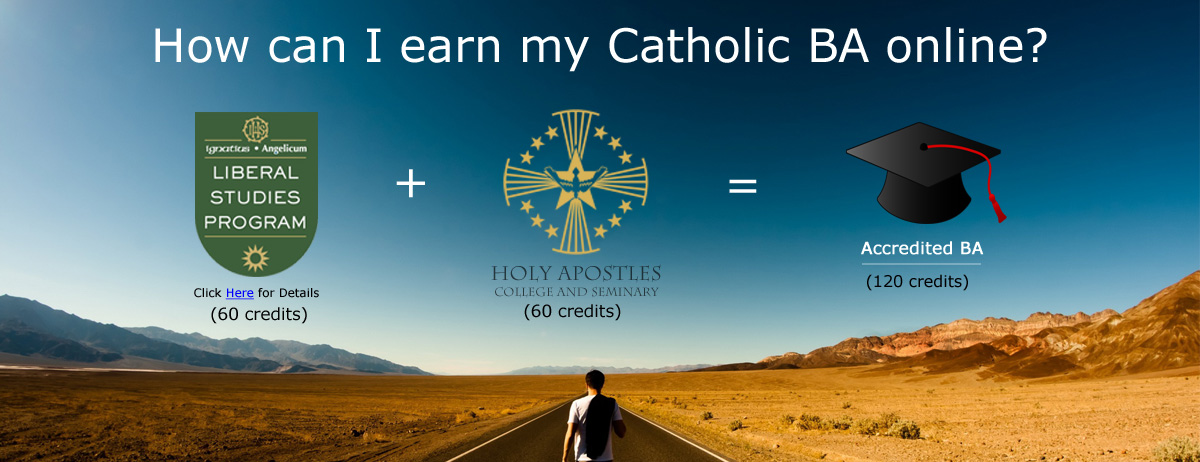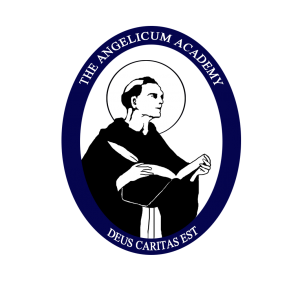 FIRST PART OF THE DEGREE PROGRAM
FIRST PART OF THE DEGREE PROGRAM
SECOND PART OF THE DEGREE PROGRAM
HOLY APOSTLES COLLEGE
Summary of the Program
The 120-credit hour Bachelor of Arts Degree program, which provides a philosophically-based Catholic honors liberal arts curriculum with a major in Philosophy, Theology, English in the Humanities, or History in the Social Sciences, can be pursued completely on-campus or completely online or a mixture of both on-campus and online courses. Students who complete at least ten courses in any of the four major areas may double major. The program is designed to give the student the proper preparation for graduate work in a related area, for teaching, or for ministry.
The B.A. program requires an understanding of Philosophy, Theology, Humanities, Social Sciences, Mathematics and the Physical Sciences.
A maximum of ninety credit hours with a grade of C or higher will be accepted for transfer into the B.A. program, provided credits are from accredited colleges, have not already been used for a Bachelor’s degree or higher, and are applicable to the B.A. degree. Of accepted transfer credits, only fifteen may be in a student’s area of concentration. Acceptance of transfer credits is at the discretion of the Academic Dean.
There is a six-year time limit from entry into the program for completion of the degree requirements.
Admission Requirements to the B.A. Program
Applicants for the B.A. program should follow the College Division Admissions Procedure. They must possess a high school diploma or equivalent. Applicants must be able to show proficiency in both English and Mathematics, either evidenced by previous college experience, or by proficiency exam.
Classification
Beginning July 1, 2015, students may transfer into their degree program as many as, but no more than, 60 credits.
1) Freshman, 0-29 credits
2) Sophomore, 30-59 credits
3) Junior, 60-89 credits
4) Senior, 90-120 credits
Undergraduate Core Curriculum
Download a degree planning checklist – Word Format or PDF
Disciplines Descriptions for the Bachelor of Arts Degree
Humanities
These courses include Art, English, Literature, and Speech. Additional Philosophy courses beyond the requirement may also be used as Humanities credits. These courses develop the student’s ability to express and articulate abstract concepts to a broad audience.
Mathematics and Physical Sciences
Courses in Mathematics and the Physical Sciences are required for a rounded college education. Courses may be taken at Holy Apostles or at another accredited college or university.
Philosophy
These courses will examine the basic areas of philosophy as they relate to Christian Theology. Logic, Epistemology, and Metaphysics provide students with an understanding of the foundations of philosophical thinking. Courses such as Philosophy of God or Ethics lead students to a deeper intellectual insight into the Christian belief structure. The courses are geared to help the student combine faith with knowledge and to practice looking at life through the paradigm of Christian Theology.
Theology
These courses include Scripture, Religious Education, the Catechism of the Catholic Church, Theological Research and Writing, Moral and Dogmatic Theology, and Evangelization. They help students to acquire a better understanding of the Living Tradition and the Living Word, and to further develop their own personal spirituality.
Social Sciences
These courses study the social aspect of human life including Psychology, Sociology, Anthropology, History and Education. They are intended to help the student bring the Gospel message to others in a culturally relevant way by better understanding the perspectives from which others view the Christian faith.



